扩音器外交对马拉维雄心勃勃的夏尔-赞比西河航道项目的危害
IF 0.5
Q4 AREA STUDIES
引用次数: 0
摘要
自1964年马拉维独立以来,内陆地缘政治局势一直是影响马拉维外交政策的主要主题。莫桑比克与马拉维有一条从东南到西南的漫长边界线,并为其贸易和商业提供了最近的港口城市。为了贸易的目的,马拉维使用了四条所谓的走廊,其中三条经过莫桑比克。马拉维寻求解决其作为内陆国家的地缘政治劣势似乎经常与莫桑比克的国家利益发生冲突。本文批判性地讨论了马拉维最近在夏尔-赞比西河航道项目的保护下为改善其地缘政治地位所做的一项极具争议的努力。该项目的主要目标是为马拉维提供通过莫桑比克港口城市Chinde进入印度洋的通道。本文借鉴了一系列方法论方法,包括广泛的文献综述以及对关键线人的50多次采访。它认为,尽管该项目具有经济效益,但马拉维前总统在与莫桑比克的关系中采取的“扩音器外交”战略导致了该项目的失败。尽管“全球化”、“区域一体化”和“伙伴关系”等概念很受欢迎,但我们展示了国家利益如何继续在外交中占据至高无上的地位。这篇文章的结论是,水路项目在未来可能会在两个方面取得成功:马拉维改变其外交方式,以及两国的国家利益得到协调。本文章由计算机程序翻译,如有差异,请以英文原文为准。
The perils of megaphone diplomacy on Malawi’s ambitious Shire- Zambezi Waterway project
ABSTRACT The landlocked geo-political situation has been a dominating theme that has influenced Malawi's foreign policy since independence in 1964. Mozambique shares a long border line with Malawi surrounding it from south-east to south-west and offers the closest port city for its trade and commerce. For purposes of trade, Malawi uses four so-called corridors, three of which pass through Mozambique. Malawi's quest to deal with its geo-political disadvantage of being landlocked often appears to collide with Mozambique's national interests. This article critically discusses a recent and highly controversial effort undertaken by Malawi to improve its geo-political position under the umbrella of the Shire-Zambezi Waterway project. The main goal of the project was to provide Malawi with access to the Indian ocean through Mozambique's port city of Chinde. The article draws on a range of methodological approaches including extensive literature review as well as over fifty interviews with key informants. It argues that despite the project's economic benefits, the ‘megaphone diplomacy’ strategy that the former Malawian president adopted in relation to Mozambique resulted in the failure of the project. In spite of the popularity of concepts such as ‘globalization’, ‘regional integration’ and ‘partnerships’, we demonstrate how the national interest continues to reign supreme in diplomacy. The article concludes that the waterway project may work out in the future on two possible grounds: when Malawi changes its diplomatic approach and when the national interests of both countries are harmonized.
求助全文
通过发布文献求助,成功后即可免费获取论文全文。
去求助
来源期刊

Africa Review
AREA STUDIES-
CiteScore
1.80
自引率
12.50%
发文量
22
期刊介绍:
Africa Review is an interdisciplinary academic journal of the African Studies Association of India (ASA India) and focuses on theoretical, historical, literary and developmental enquiries related to African affairs. The central aim of the journal is to promote a scholarly understanding of developments and change in Africa, publishing both original scholarship on developments in individual countries as well as comparative analyses examining the wider region. The journal serves the full spectrum of social science disciplinary communities, including anthropology, archaeology, history, law, sociology, demography, development studies, economics, education, gender studies, industrial relations, literature, politics and urban studies.
 求助内容:
求助内容: 应助结果提醒方式:
应助结果提醒方式:


